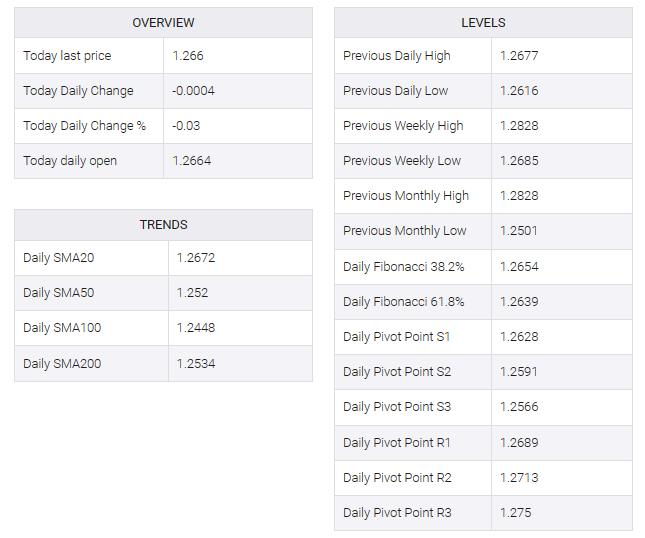-
GBP/USD struggles to gain any meaningful traction amid a mixed fundamental cue.
-
An uptick in the US bond yields underpins the USD and cap the upside for the pair.
-
Traders also seem reluctant and keenly await the release of the US NFP on Friday.
The GBP/USD pair fails to capitalize on the previous day’s modest recovery from the vicinity of the 1.2600 mark, or a near three-week low and oscillates in a narrow band during the Asian session on Thursday. Spot prices currently trade around the 1.2660 region, nearly unchanged for the day.
The British pound (GBP) fell as UK business leaders are more pessimistic about the outlook for the economy and are pushing the Bank of England (BoE) to start cutting rates earlier this year. In fact, money market prices indicate that traders expect a rate cut of around 140 basis points (bps) in 2024. Apart from this, a modest US Dollar (USD) strength is seen to act as a headwind for the GBP/USD pair.
Minutes of the December 12-13 FOMC meeting released on Wednesday did not provide any clues as to when a series of rate cuts by the Federal Reserve (Fed) might begin. This, in turn, raises US Treasury bond yields and gives some support to the buck. This, along with a generally weak tone around equity markets, benefited the safe-haven greenback and contributed to keeping a lid on the GBP/USD pair.
Markets, however, priced in a greater likelihood of a 25-basis point (bps) Fed rate cut in March, which should cap a week-old rally in US Treasury bond yields. This could prevent USD bulls from placing aggressive bets and help limit the downside of the GBP/USD pair. Investors also seem reluctant and prefer to sideline ahead of the release of the US monthly jobs report (NFP) on Friday.
In the meantime, Thursday’s economic docket, featuring the final Services PMIs from the UK and the US, along with the US ADP report on private-sector employment, will be looked upon for short-term trading impetus. Nevertheless, the aforementioned mixed fundamental backdrop warrants caution before positioning for an extension of the recent pullback from a near five-month peak, around the 1.2825-1.2830 area touched last week.


